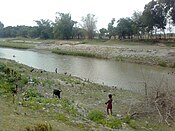 Jasimuddin (Bangla: জসীমউদ্দীন) (full name Jasimuddin Mollah) (1903–1976) was a renowned Bengali poet, songwriter, prose writer, folklore collector and radio personality. He is commonly known in Bangladesh as Polli Kobi, the Rural Poet for his faithful rendition of Bangla folklore in his works. Jasimuddin was also one of the pioneers of the progressive and non-communal cultural movement in East Pakistan.
Jasimuddin (Bangla: জসীমউদ্দীন) (full name Jasimuddin Mollah) (1903–1976) was a renowned Bengali poet, songwriter, prose writer, folklore collector and radio personality. He is commonly known in Bangladesh as Polli Kobi, the Rural Poet for his faithful rendition of Bangla folklore in his works. Jasimuddin was also one of the pioneers of the progressive and non-communal cultural movement in East Pakistan.| Born | January 1, 1903 Tambulkhana, Faridpure |
|---|---|
| Died | March 13, 1976 (aged 73) Dhaka |
| Occupation | poet, songwriter, writer, radio personality, teacher |
Jasimuddin was born in the village of Tambulkhana in Faridpur District on 1 January 1903 in the house of his maternal uncle. His father, Ansaruddin Mollah, was a school-teacher. Jasimuddin received early education at Faridpur Welfare School. He matriculated from Faridpur Zilla School in 1921. Jasimuddin completed IA from Rajendra College in 1924.

He obtained his BA and MA degree in Bangla from the University of Calcutta in 1929 and 1931 respectively. From 1931 to 1937, Jasimuddin worked with Dinesh Chandra Sen as a collector of folk literature. Jasimuddin is one of the compilers of Purbo-Bongo Gitika (Ballads of East Bengal). He collected more than 10,000 folk songs, some of which has been included in his song compilations Jari Gaan and Murshida Gaan. He also wrote voluminously on the interpretation and philosophy of Bengali folklore.
Jasimuddin joined the University of Dhaka in 1938 as a Lecturer. He left the university in 1944 and joined the Department of Information and Broadcasting. He worked there until his retirement as Deputy Director in 1962.
Jasimuddin died on 13 March 1976 and was buried near his ancestral home at Gobindapur, Faridpur.
PoetryJasimuddin started writing poems at an early age. As a college student, he wrote the celebrated poem 'Kabar' (grave), a very simple tone to obtain family-religion and tragedy.

The poem was placed in the entrance Bangla textbook while he was still a student of Calcutta University.
Jasimuddin is noted for his depiction of rural life and nature from the viewpoint of rural people. This had earned him fame as Polli Kobi (the rural poet). The structure and content of his poetry bears a strong flavor of Bengal folklore. His Nokshi Kanthar Maath (Field of the Embroidered Quilt) is considered a masterpiece and has been translated into many different languages.
Jasimuddin also composed numerous songs in the tradition of rural Bengal. His collaboration with Abbas Uddin, the most popular folk singer of Bengal, produced some of the gems of Bangla folk music, especially of Bhatiali genre. Jasimuddin also wrote some modern songs for the radio. He was influenced by his neighbor, poet Golam Mostofa, to write Islamic songs too. Later, during the liberation war of Bangladesh, he wrote some patriotic songs. He is one of the best poet in Bangladesh.

- Rakhali (1927)
- Nokshi Kanthar Maath (1929)
- Baluchor (1930)
- Dhankhet(1933)
- Sojan Badiyar Ghat (1934)
- Rangila Nayer Majhi (1935)
- Hashu (1938)
- Rupobati (1946)
- Matir Kanna (1951)
- Sakina (1959)
 Wide open field where poet spent most of his childhood
Wide open field where poet spent most of his childhood - Suchayani (1961)
- Bhayabaha Sei Dingulite (1972)
- Ma je Jononi Kande(1963)
- Holud Boroni (1966)
- Jole Lekhon (1969)
- Padma Nadir Deshe (1969)
- Beder Meye (1951)
- Kafoner Michil (1978)
Drama
- Padmapar (1950)
- Beder Meye (1951)
- Modhubala (1951)
- Pallibodhu (1956)
- Gramer Maya (1959)
- Ogo Pushpodhonu (1968)
- Asman Shingho (1986)
Novel
Boba Kahini (1964)
Memoirs
- Jader Dekhachi (1951)
- Thakur Barir Anginay (1961)
- Jibonkotha (1964)
- Smritipot (1964)
- Smaraner Sarani Bahi (1978)
Travelogues
- Chole Musafir (1952)
- Holde Porir Deshe (1967)
- Je Deshe Manush Boro (1968)
- Germanir Shahare Bandare (1975)
Music books
- Rangila Nayer Majhi
- Padmapar (1950)
- Gangerpar
- Jari Gan
- Murshida Gan
- Rakhali Gan
- Baul
Others
- Dalim Kumar (1986)
- Bangalir Hasir Galpa(Part 1 & 2)
Song Titles

- Amar sonar moyna pakhi
- Amar golar har khule ne
- Amar har kala korlam re
- Amay bhashaili re
- Amay eto raate
- Kemon tomar mata pita
- Nishithe jaio fulobone
- Nodir kul nai kinar nai
- O bondhu rongila
- Prano shokhire
- Rangila nayer majhi
Major honors and awards
- President's Award for Pride of Performance, Pakistan (1958)
- DLitt. by Rabindra Bharati University, India (1969)
- Ekushey Padak, Bangladesh (1976)
- Independence Day Award, Bangladesh -posthumous (1978)
Legacy
- A fortnightly festival known as Jasim Mela is observed at Gobindapur each year in January commemorating the birthday of Jasimuddin.
- A residential hall of the University of Dhaka bears his name.
No comments:
Post a Comment